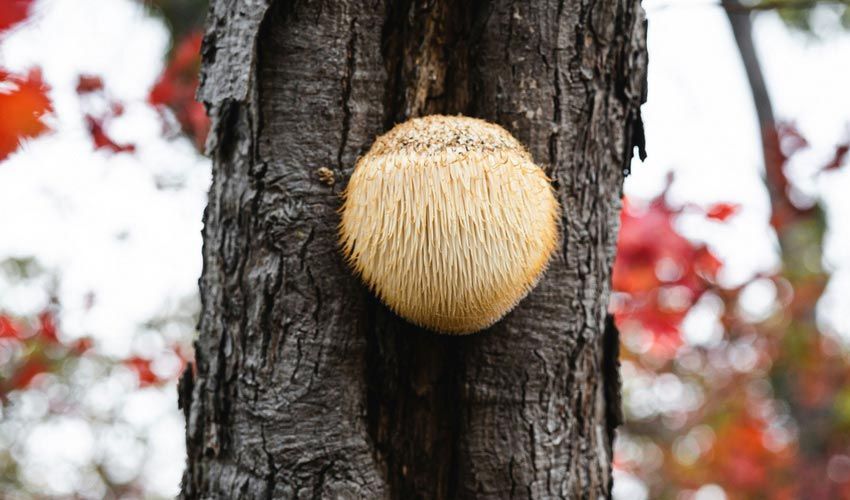Lion's Mane - The Mind Mushroom
Discover the magic of the Lion's Mane Mushroom! This whimsical, pom-pom-like fungus hides powerful health benefits within its unexpected appearance. Step into the enchanted forest of natural remedies and explore the wonders of this unique and beneficial ingredient. The Lion's Mane Mushroom can be found in forests worldwide and has been utilised in traditional Chinese medicine for centuries. Unlike typical mushrooms, Lion's Mane stands out for its ability to potentially improve cognitive function, elevate mood, and alleviate symptoms of anxiety and inflammation. So, the next time you encounter these fluffy growths, remember that they could be your key to a healthier and happier lifestyle.

In ancient times, the mighty Lion's Mane Mushroom was the talk of the town in both Asia and Europe. It was like the gem of the mushroom world - known for its glamour and star power, with a history steeped in both medicine and haute cuisine. Back in the day, around 450 BCE, the OG of medicine, Hippocrates himself, was all about that Lion's Mane life. He knew these fungi have some serious anti-inflammatory properties and can even help with wound cauterisation." Basically, he was the original mushroom influencer. Lion's Mane isn't some basic mushroom that grows on anything. It's a high-maintenance diva that only hangs out on old or dead broadleaf tree trunks. You know, the bougie trees that shed their leaves and spread their seeds in style. The Lion's Mane is a double threat, with its visible fruiting body (aka the mushroom) and its mycelium (the roots) working together to bring all the health benefits to the table. So, next time you spot a Lion's Mane Mushroom, bow down and show some respect to this fungi superstar. It's not just a pretty face - it's a powerhouse of potential health benefits. Neurological Activity of Lion’s Mane (Hericium erinaceus)
Lion’s Mane Health Benefits
If you're looking to improve your physical, cognitive, and mental well-being, look no further than the mighty Lion's Mane Mushroom. This funky fungus is packed with bioactive compounds that are basically like little health heroes running around your body. Not only does it fight off diseases like cancer and microbes, but it also acts as an antioxidant to keep your cells happy and healthy. But wait, it doesn’t sop here! According to some smarty-pants researchers in the Journal of Agricultural and Food Chemistry, Lion's Mane may even be able to protect your precious nerves from going on strike. So, if you want to give your body a little extra love, consider adding some Lion's Mane Mushroom to your diet. Who knew something so weird looking could be such a powerhouse for your health? Let’s have a closer look at the health benefits:
- Blood Sugar Regulation
- Decreases High Blood Pressure Levels
- Supports Healthy Energy Levels & Fights Tiredness
- Aids Preventing Excess Blood Lipid Accumulation
- Protects Cardiovascular Health
- Slows Biological Ageing
- Protects Kidney Health
- Protects Liver Health
Possible New Approach for Treating Depression
Move over Prozac, there's a new sheriff in town and it's wearing a Lion's Mane! According to the latest gossip in the Journal of Molecular Science, researchers are buzzing about the potential of lion's mane mushroom as a treatment for depression. This fungi is not just a fun guy to hang out with in the forest, it's also packed with benefits that could put a smile on even the grumpiest of faces. Significantly lower nerve growth factor levels in patients with major depressive disorder than in healthy subjects: a meta-analysis and systematic review
The abstract dishes the dirt on 3 ways Lion's Mane may help kick those blues to the curb. First off, it makes sure those neurotransmitters are running smoothly, like a well-oiled machine. No more misfiring signals causing chaos in your brain. Secondly, it puts a stop to the nerve growth that goes AWOL during stressful times. Who needs the drama of lost nerve growth anyway? And lastly, it tackles inflammation, the silent but deadly culprit behind many cases of depression. Therapeutic Potential of Hericium erinaceus for Depressive Disorder
And there's even more! A meta-analysis from 2015 spilled the beans that people with major depressive disorder may have a shortage of nerve growth factor compared to the happy-go-lucky non-depressed folks. This factor is crucial for keeping those nerve cells in tip-top shape, which is key for regulating mood. Cue Lion's Mane, swooping in like a knight in shining armour to boost that nerve growth factor and save the day! Dr. Lexi Watson, the brilliant mind behind Oakley Wellness, is all aboard the Lion's Mane hype train. She's been stirring up potions and conducting studies left and right, all in the name of brain health and living your best life. So next time you're feeling down in the dumps, remember that a Lion's Mane a day might just keep the blues away.

May Improve Brain Health
It seems that Lion's Mane is the superhero of mushrooms, swooping in to save the day when our brains are feeling a bit foggy. With its magical powers of increasing nerve growth factor levels, it's like a brain booster on steroids, ready to take on the villainous Alzheimer's disease and any other cognitive impairment disorders that dare to mess with it. According to many researchers, Lion's Mane is basically a brain-boosting magician, sprinkling its fairy dust of nootropic compounds to improve brain health and function. And let me tell you, Dr. Cooperman is like the Gandalf of the supplement world, warning us that while Lion's Mane may work some magic on memory and cognitive function, the results are as inconsistent as a Tinder date. Sure, there may be some modest improvements, but let's not expect it to turn us into Einstein overnight.
But hey! Don't count Lion's Mane out just yet. In a study straight out of a fantasy novel, adults took Lion's Mane tablets 3 times a day for 16 weeks and actually saw improvements in their cognitive function. It was like they were Gandalf wielding a staff against the Balrog of memory loss. Unfortunately, once they stopped taking the tablets, their cognitive scores plummeted faster than a dragon falling off a cliff. So, maybe Lion's Mane is more of a temporary knight in shining armour rather than a lifelong saviour. Improving effects of the mushroom Yamabushitake (Hericium erinaceus) on mild cognitive impairment: a double-blind placebo-controlled clinical trial
Supports Recovery of Brain Injury
A recent study published in Antioxidants has uncovered some exciting news for those suffering from traumatic brain injuries (TBI) - enter the magical world of Lion's Mane! This study reveals that not only does Lion's Mane Mushroom show potential neuroprotective effects, but coriolus versicolor, aka Turkey Tail Mushroom, is also in on the action. These fungi are like the dynamic duo of the mushroom world, fighting off inflammation and oxidative stress that often wreak havoc on TBI survivors.
It turns out that the neurodegeneration caused by TBI isn't just a one-time deal - it can set the stage for future dramas like Parkinson's disease. Fortunately, by incorporating this mighty mushroom into a treatment plan, the impact of brain trauma and potential complications like Parkinson's disease could be significantly reduced. So let's raise a toast to Lion's Mane, the hero we never knew we needed in the fight against TBI! Hericium erinaceus and Coriolus versicolor Modulate Molecular and Biochemical Changes after Traumatic Brain Injury
Decreases Stress & Anxiety
In a stroke of genius, Best suggests that Lion's Mane could be the secret weapon in our battle against stress. In a groundbreaking 2010 study from Biomedical Research, it was found that participants who indulged in some delectable Lion's Mane cookies experienced a decrease in anxiety over the course of 4 weeks. Yes, you heard that right - cookies with a sprinkling of powdered Lion's Mane actually helped people chill out more than those sad souls munching on placebo cookies. The brilliant minds behind the study believe it's all thanks to the magical nerve growth properties of this mystical mushroom. So next time you're feeling frazzled, reach for a Lion's Mane cookie instead. Your nerves will appreciate it!

Promotes Gastrointestinal Health
Extensive research indicates that the Lion’s Mane Mushroom possesses ulcer-inhibiting properties that may be attributed to its impact on the helicobacter pylori (H. pylori) bacteria. The presence of H. pylori in the stomach is known to be a leading cause of various stomach issues, including ulcers, as highlighted in a study published in the Journal of Ethnopharmacology. Anti-Gastric Ulcer Activity of Polysaccharide Fraction Isolated from Mycelium Culture of Lion's Mane Medicinal Mushroom, Hericium erinaceus (Higher Basidiomycetes)
Last Words
As you can see by now, Lion’s Mane truly is a healing mushroom. You can benefit from this ‘mind mushroom’s’ health benefits as well. Ancient Purity Lion's Mane Mushroom Capsules are believed to provide a range of health benefits due to their high levels of bioactive compounds. Capsules provide a convenient way to experience the mushroom’s benefits. They are commonly used to support cognitive function and brain health, as they have been shown to promote nerve growth and protect against neurodegenerative diseases like Alzheimer's and dementia. Additionally, Lion's Mane Mushroom Capsules may help improve mood, reduce inflammation, boost the immune system, and support overall health and well-being. Try it! You won’t regret it.
“Lions mane may be our first smart mushroom. It is a safe, edible fungus that appears to confer cognitive benefits on our ageing population.” - Paul Stamets






















